Avogadro’s number - Study guides, Class notes & Summaries
Looking for the best study guides, study notes and summaries about Avogadro’s number? On this page you'll find 118 study documents about Avogadro’s number.
Page 2 out of 118 results
Sort by
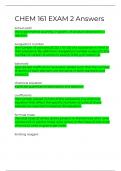
-
CHEM 161 EXAM 2 Questions with complete Answers Rated A+
- Exam (elaborations) • 14 pages • 2023
- Available in package deal
-
- $11.49
- + learn more
actual yield the experimental quantity, in grams, of product obtained in a reaction. Avogadro’s number the number of particles (6.022 x 10^23) of a substance in 1 mol of that substance. By definition, Avogadro’s number is equal to the number of carbon-12 atoms in exactly 12.00 g of carbon-12
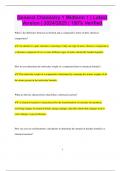
-
General Chemistry 1 Midterm 1 | Latest Version | 2024/2025 | 100% Verified
- Exam (elaborations) • 17 pages • 2024
- Available in package deal
-
- $9.75
- + learn more
General Chemistry 1 Midterm 1 | Latest Version | 2024/2025 | 100% Verified What is the difference between an element and a compound in terms of their chemical composition? An element is a pure substance consisting of only one type of atom, whereas a compound is a substance composed of two or more different types of atoms chemically bonded together. How do you determine the molecular weight of a compound from its chemical formula? The molecular weight of a compound is determined by s...
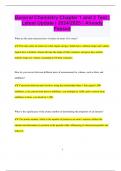
-
General Chemistry Chapter 1 and 2 Test | Latest Update | 2024/2025 | Already Passed
- Exam (elaborations) • 23 pages • 2024
- Available in package deal
-
- $9.75
- + learn more
General Chemistry Chapter 1 and 2 Test | Latest Update | 2024/2025 | Already Passed What are the main characteristics of matter in terms of its states? The main states of matter are solid, liquid, and gas. Solids have a definite shape and volume, liquids have a definite volume but take the shape of their container, and gases have neither definite shape nor volume, expanding to fill their container. How do you convert between different units of measurement for volume, such as lite...
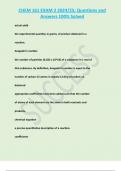
-
CHEM 161 EXAM 2 2024/25; Questions and Answers 100% Solved
- Exam (elaborations) • 24 pages • 2024
-
- $13.49
- + learn more
CHEM 161 EXAM 2 2024/25; Questions and Answers 100% Solved actual yield the experimental quantity, in grams, of product obtained in a reaction. Avogadro’s number the number of particles (6.022 x 10^23) of a substance in 1 mol of that substance. By definition, Avogadro’s number is equal to the number of carbon-12 atoms in exactly 12.00 g of carbon-12. balanced
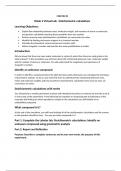
-
CHEM 120 Week 3 Virtual Lab; Stoichiometric Calculations Part I, Part II
- Other • 3 pages • 2023
- Available in package deal
-
- $20.99
- + learn more
Learning Objectives: • Explain the relationship between mass, molecular weight, and numbers of atoms or molecules and perform calculations deriving these quantities from one another • Perform mass-to-mass stoichiometric calculations via conversions to moles • Identify the limiting and excess reagents in a chemical reaction • Calculate the theoretical, actual and percent reaction yield • Define Avogadro’s number and describe the mole quantification of matter
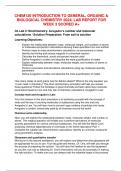
-
CHEM120 INTRODUCTION TO GENERAL, ORGANIC & BIOLOGICAL CHEMISTRY 2024| LAB REPORT FOR WEEK 3 SCORED A+
- Exam (elaborations) • 4 pages • 2024
- Available in package deal
-
- $10.49
- + learn more
CHEM120 INTRODUCTION TO GENERAL, ORGANIC & BIOLOGICAL CHEMISTRY 2024| LAB REPORT FOR WEEK 3 SCORED A+ OL Lab 3: Stoichiometry: Avogadro’s number and molecular calculations / Solution Preparation: From salt to solution Learning Objectives: • Explain the relationship between mass, molecular weight, and numbers of atoms or molecules and perform calculations deriving these quantities from one another • Perform mass-to-mass stoichiometric calculations via conversions to moles • Ident...
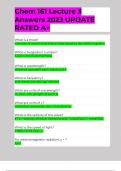
-
Chem 161 Lecture 3 questions with complete Answers 2023 UPDATE RATED A+
- Exam (elaborations) • 8 pages • 2023
- Available in package deal
-
- $11.49
- + learn more
What is a mole? number of atoms that has a mass equal to the AMU in grams What is Avogadro’s number? 6.022 x 10^23 atoms/mole What is wavelength? distance between each wave unit λ
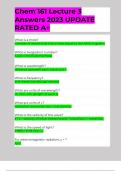
-
Chem 161 Lecture 3 Answers 2023 UPDATE RATED A+
- Exam (elaborations) • 8 pages • 2023
-
- $9.49
- + learn more
Chem 161 Lecture 3 Answers 2023 UPDATE RATED A+ What is a mole? number of atoms that has a mass equal to the AMU in grams What is Avogadro’s number? 6.022 x 10^23 atoms/mole What is wavelength? distance between each wave unit λ What is frequency? # of waves (cycles) per second What are units of wavelength? m, mm, nm (length of each λ) What are units of v? cycles/sec waves/sec sec^-1 Hz (heartz) What is the velocity of the wave? λ * v = velocity of wave (meter/wave) * (wave/s...
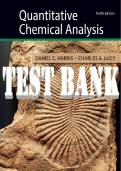
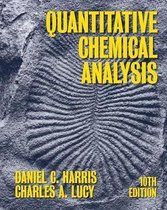
-
TEST BANK FOR QUANTITATIVE CHEMICAL ANALYSIS 10TH EDITION
- Exam (elaborations) • 308 pages • 2024
-
- $26.99
- + learn more
TEST BANK FOR QUANTITATIVE CHEMICAL ANALYSIS 10TH EDITION 1. Which constant is NOT used to define the fundamental SI units? a. Avogadro’s number b. speed of light in vacuum c. elementary charge d. Planck’s constant e. π 2. A satellite in low Earth orbit with a circular orbit has an orbital speed of 7.3 km/s relative to the Earth’s surface. Calculate the satellite’s speed in miles per hour. (1 mi = 1.609 km) a. 1.6 × 104 mi/h b. 1.3 × 10−3 mi/h c. 4.2 × 10...

-
CHE 101 Lab 7: Estimating Avogadro’s Number. Complete Solution
- Essay • 10 pages • 2022
-
- $8.49
- + learn more
CHE 101 Lab 7: Estimating Avogadro’s Number. Complete Solution.Purpose: The purpose of this lab is to learn how to use Avogadro’s Number to estimate the number of atoms, knowing the mass and volume of an object. Pre-laboratory Questions 1. The stearic acid/hexane solution contains 0.1 g of stearic acid per 1 mL of solution. What is the molarity of this solution? Stearic acid’s molecular mass is 284.48 g/mol. The number of moles in 1 mL solution is 0.1g /284.48 g/mol = 0. mol. Mol...

Did you know that on average a seller on Stuvia earns $82 per month selling study resources? Hmm, hint, hint. Discover all about earning on Stuvia


